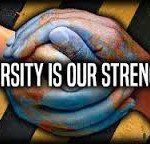As I prepared to be a panelist at the “With Mutual Respect” event, I unexpectedly had an exchange on Facebook that modelled the sort of dialogue we hoped to have on display in late September.  A Facebook friend, whom I’ve not met in person but with whom I have exchanged a number of pleasantries (some rooted in our love of the Red Sox, others in our shared New England heritage, even others in our perceived agreement on many political/social issues) posted a meme on his FB site. It was from a Jewish rabbi, apparently copied and pasted from the site previously known as Twitter (where I no longer hang out).
A Facebook friend, whom I’ve not met in person but with whom I have exchanged a number of pleasantries (some rooted in our love of the Red Sox, others in our shared New England heritage, even others in our perceived agreement on many political/social issues) posted a meme on his FB site. It was from a Jewish rabbi, apparently copied and pasted from the site previously known as Twitter (where I no longer hang out).
A fetus is not a person. We aren’t alive after we take our last breath, and we aren’t alive before we take our first one. The idea that the fetus is a person is a Christian idea. Which is fine! Christians should follow their faith! They just shouldn’t legislate it on the rest of us.
I had just recently found out that this is the basic Jewish position concerning the unborn. Not surprisingly, my friend’s post generated a great deal of discussion, some of which I could not avoid getting involved with.
I had a particularly interesting exchange with one gentleman whose initial responses to the rabbi’s meme were that it was “BS” and “incorrect.” Not a very promising start. A bit further down the thread, this gentleman pushed back specifically against the idea that breathing and life are coterminous. What follows is our interaction over the next half hour or so, with some commentary inserted via bullet points. Please note: I include this conversation not in the hope of convincing readers to agree with me, but rather to demonstrate how people of good faith with conflicting starting assumptions can engage on a controversial issue without resorting to name-calling and dismissive judgment.
Him: Breathing alone does not define life. I’m surprised you believe the unborn child is not human or alive. If killed in an auto accident, a fetus is treated, rightly, as both human and alive before killed in the accident with appropriate liabilities under the law.
- That’s where I jumped into the discussion for the first time.
Me: The unborn fetus is alive and it’s human. That doesn’t have any bearing on whether a fetus has rights, which is the crux of the abortion debate. Is the unborn fetus a person or isn’t it?
- Here I expected pushback against my distinction between “human” and “person,” a distinction that for me is at the heart of the abortion debate but which is seldom talked about seriously. A different participant on this thread dismissed the distinction as “bullshit semantics,” so I was pleased to see that this particular guy respected the distinction. Being human is not what grants rights—personhood does.
Him: Science in 2022 as opposed to 1973 clearly can state that the unborn child is human. Now the question is, does it have a right to life? I would say that as surely as a slave had a right to be free under unalienable rights and the Constitution, the unborn has an inalienable right to life. By unalienable I mean by law above man-made law. Now what the court has done has been to leave this debate to the states. Which is fine by me. Some states, like mine, will say no, the unborn doesn’t have a right to life that supersedes the mother’s right. Other states will segregate the rights of the mother and the right of the child to have a chance at life.
- Thank you for recognizing that being human and having rights are two different issues! I’ve heard the comparison of fetuses to slaves before, but I’m not buying it.
Me: As I said, of course the fetus is human. Your comparison of fetus and slave ignores the important difference that the slave is a breathing, autonomous human person while the fetus is neither breathing, autonomous, nor a person. Given that the laws we live under govern both those who believe in a law above human made laws and those who do not, every law must be considered as human made, since that’s the only type of law whose authority everyone can agree on. Odd that it is “fine by you” if some states determine that the fetus has no rights and others determine that it does, since in your estimation the fetus’ right to life is “inalienable,” rooted in something that transcends human law. I would argue that the fetus is human, alive, and is not a person, while the pregnant woman is human, alive, and fully a person with rights that must not be violated in deference to the fetus.
- At this point, of course, I expected the usual “you’re full of shit” social media response that I have become accustomed to. But wait . . .
Him: I get your argument but don’t agree. It has a ring to it. Slave owners would say that slaves were human, alive, but not a person. And I do believe as the Founders did that there is law above human law that is at the root of all rights to mankind. The government does not grant us rights. Something above government does. Since we’re not going to agree on these premises, I don’t see any point in debating this. To people who agree that the source of rights transcends elected officials, I appeal my point.
- “I get your argument but don’t agree.” Your argument makes sense, but it isn’t convincing. How different our conversations about controversial issues would be if this is where we went rather than “you are a moron” or “you are going to hell for believing that.” Controversial issues invite disagreement.
Me: Disagreement is good. And I agree that when foundational assumptions are incompatible, then debate is likely to go nowhere. I respect your belief that there is a law above human law (I actually share that belief), but we live in a secular society that cannot rely on a premise or framework that millions of people do not believe in. Final point: Government does grant rights and take them away—just ask the women in the country in the wake of the Supreme Court’s overturning of Roe v Wade.
The other guy responded with a thumbs up “like” and that was the end of our discussion. I was encouraged. People who mutually respect each other might very well be starting from premises that are incompatible. Aristotle points out that when the disagreement is at the level of first principles, further conversation might be fruitless. But we still need to discuss and compromise going forward. Rather than assuming that our individual principles are the only valid ones, it is important to recognize that those who disagree very well might also have good arguments.













